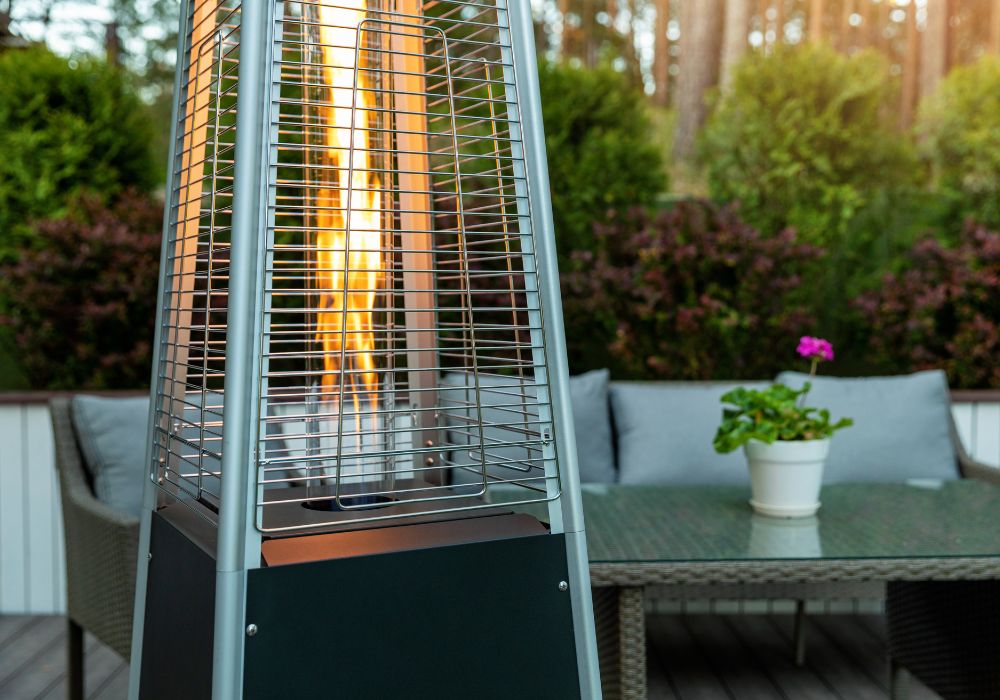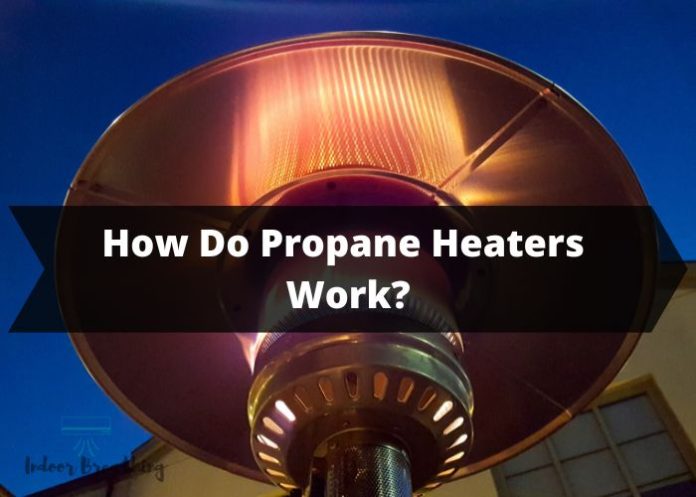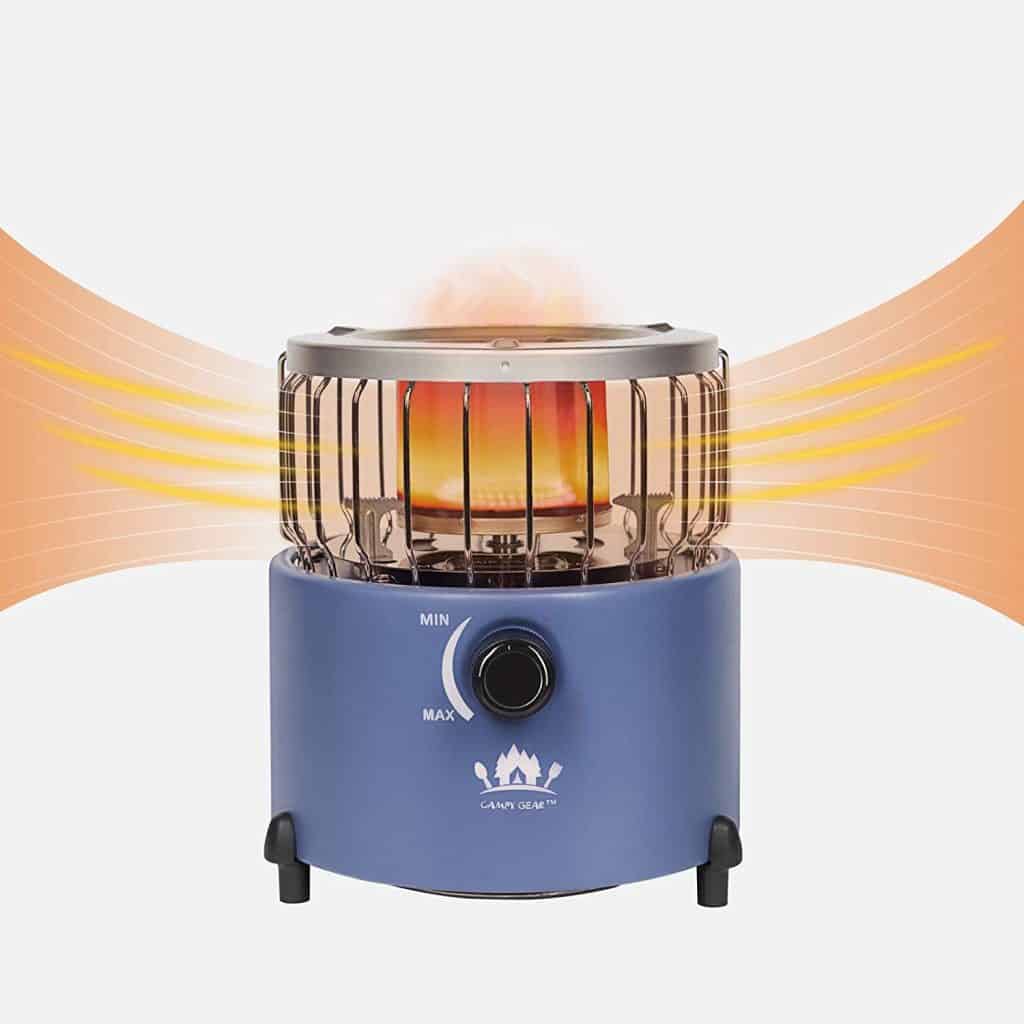Propane heaters are a fantastic technique to swiftly heat a medium to massive room while using liquid propane as a source. Over time, the effectiveness and demand for these heaters have skyrocketed.
With 99% efficiency, propane heaters can be enjoyed indoors and outdoors. Whether you’re building your own house and need to choose a heat source, replace your current heating system, or purchase a home that operates on propane, you will need to know everything about a propane heater. These heaters are efficient, easy to maintain, affordable, and quick to install.
These are just a few factors to consider when choosing a heating system, particularly if you have an option. Although natural gas, heating oil, and propane heating are the three most common methods of home heating throughout the world, due to many advantages, propane heaters are among the most used ones.
In this article, we will discuss what propane heaters are, how they work, and their advantages and disadvantages.
Table of Contents
What Is a Propane Heater?

Propane is manufactured and kept as a liquid in a tank before being discharged as a gas.
Garage, warehouse, and Patio heaters use pressurized propane to warm places that aren’t adequately insulated. These heaters are usually portable, allowing them to be brought out for important events.
Propane heaters mainly do not require external gas lines or electricity. Most people, including homeowners, event planners, and construction companies, prefer propane heaters.
How Many BTUs Is a Propane Heater?
Propane heaters are available in many types, strengths, and sizes. Propane heaters are rated in British Thermal Units to assess their energy output.
A modest room of 100 square feet would only require 10,000 BTUs, whereas a large garden or warehouse could require up to 200,000 BTUs to heat 5,000 square feet.
Types Of Propane Heaters
A vent or power is usually not required for portable heaters. They’re lit with a match, connected to a small propane tank, and moved around for convenient movement.
Some propane heaters are tall and contain a hooded shield and a torchiere. These heaters can be used for outdoor meals and partying on patios, lawns, and decks.
Other heaters are smaller boxes, usually convection and radiant, commonly seen in workshops, garages, and sheds. They move the air by utilizing natural air currents.
The propane heaters are both attached or portable. They can also be attached to a compact dolly, filling them at a gas station that sells propane.
Permanent propane heaters require a construction permit and must be attached to the ceiling, wall, or floor. They distribute the heat in the room with the help of forced air components.
Propane heaters are connected with an electrical socket since the fan needs to be powered by electricity. These heaters are generally larger and necessitate an outside vent. As propane requires oxygen to burn, any confined location with a gas heater must access fresh oxygen.
Propane-fueled heaters function similarly to methane-fueled heaters. An HVAC professional can convert gas heaters connected to the gas grid to propane.
Compared to methane, propane has the advantage of not emitting greenhouse gases and CO2 when burned. Since propane is stored, it can be acquired at a lesser cost before winter.
How Do Propane Heaters Work?
A propane heater is made of different things that make it work. A standard propane heater lighted with a match will provide heat, but it is ineffective because that is not its main purpose.
A propane heater has some characteristics that use the flame towards a more effective heating pattern while also making the heater easier to use.
-
Fuel
The fuel in heaters is called propane, which contains additional chemicals such as butane and propylene. Propane is a fuel that burns cleanly and efficiently. It is generally a gas; however, propane is compressed into a liquid for use in grills and heaters.
-
Igniter
It features a pilot light that constantly burns a small flame, saving you time from repeatedly lighting it from scratch. All you have to do is pull the ignition button while pushing down the control knob until a flame appears in the pilot light.
-
Element
Propane heaters have an element. Usually, porcelain spreads the flame in a pattern and distributes the heat from the fuel.
-
Pilot
A pilot light is a tiny flame that burns almost continuously and consumes little fuel. Once the flame appears, you can let it burn even when the heater is not working. It saves you time.
It aims to allow you to instantly light the main burner instead of building from zero with the igniter every time.
-
Control
In a heater, the ability to regulate temperature is a useful attribute. An automatic thermostat is a common technique; some advanced heaters may include one.
However, many heaters don’t have this option and use manual flame control with a low and high setting range.
-
Carbon monoxide
Carbon monoxide poisoning can occur when propane is burned in small enclosed spaces. Carbon monoxide is an odorless gas that causes suffocation by competing with oxygen in your blood.
Propane Heating Cost Estimator
Propane prices change yearly, ranging from $2 to $2.75 per gallon.
Companies charge almost $3.25 to $4.00 per gallon for a refill.
However, you must remember that your tank will only be refilled up to 80 percent because, during hot weather, the gas expands, giving it extra space to grow.
Advantages of Propane Heat
-
It is safe:
Propane has a lot of energy in it. It has a higher octane rating than gasoline. It has a unique smell and can warn you of any leaks. Many propane heaters, including portable models, include a carbon monoxide detector that will notify you if the quantity of carbon monoxide is too high.
-
Environmentally friendly:
It does not harm the environment. Propane is an environmentally friendly fuel that burns cleaner than other fossil fuels. It doesn’t pollute the land or groundwater either. Due to its low carbon concentration, it emits very little carbon.
-
Used in emergency
Propane heaters have many applications and can be trusted in an emergency. In case of a power outage, this heater will come in handy.
-
Save money:
Propane heaters are mostly cheap, so you will save a lot of money. Electric heaters can be replaced with infrared propane heaters. You can save up to 30% on your electricity costs using propane.
Disadvantages of Propane Heat
Although propane heaters have many benefits, there are also some disadvantages that you cannot ignore.
-
Propane poisoning:
If you come into contact with liquid propane, you may get frostbite-like symptoms. Inhaling a lot of propane can result in propane poisoning, which is quite deadly.
-
Carbon monoxide production:
Carbon monoxide is released when propane is not entirely burned, which can be deadly in poorly ventilated places.
-
It is highly flammable:
It’s a dependable fuel since it burns quickly and efficiently. A gas leak in a poorly ventilated region is fatal as it can cause an explosion if it comes into touch with a spark.
-
Can cause explosion
The propane storage tank’s high pressure can cause an explosion if there is a leak. It’s better to check the storage tank before using it.
Propane Heaters FAQ
Is propane an excellent way to heat your home?
Propane is an excellent and affordable way to heat your home. One of the most significant advantages of it is that it is non-toxic. As a result, the propane tanks can be buried underground.
This gas burns clean. As a result, propane heaters often require less maintenance. They usually last longer, need fewer repairs over time, and work far more efficiently.
Do you need ventilation when using a propane heater?
You will need adequate ventilation when using a heater to avoid exhausting all the oxygen in the room and replacing it with carbon monoxide. To prevent it, provide a fresh air entry into the room through a door or a window.
Can you sleep with a propane heater on?
Falling asleep while your propane heater is on can be extremely harmful. More than 50% of all fires started by propane heaters begin this way. Other than that, you can also face the risk of carbon monoxide (CO) poisoning.
Is it cheaper to heat with propane or electricity?
Compared to electricity, heating a room with propane can be much more affordable. These heaters recover water quickly and are easier to operate.



